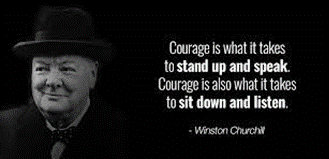
‘Success is not final, failure is not fatal. It is the courage to continue that counts.’
Stick To Your Guns
By its very nature, the notion of courage connotes danger and evokes a sense of fear. Valour isn’t required without peril. Douglas A. Hicks, dean of Oxford College of Emory University, underscores that courage not only enables someone “to take risks that others fear in order to achieve something important,” but also that doing so requires a backbone. “Courage is not about sticking one’s finger in the air to see which way the wind is blowing; what others are saying. It requires both self-confidence and resolve,” he says. “CEOs show courage when they commit to keep employees on the payroll in (the) face of recession and do whatever it takes to create long-term profitability.”
Embrace Vulnerability
Aaron Velky, CEO of Ortus Academy, believes courageous leaders also decide to be truthful and vulnerable. “Whether or not the truth is easy to share and whether you know what speaking the truth will create as an outcome, courage is the ability to offer up where you are and what is real.
Bravely delivering hard messages is not enough, however, as Velky clarifies that, “When we share truth, we have to be prepared to listen, but listening is vulnerable, and that’s important too.” He says, “Courage is owning what we are experiencing. Vulnerability is sharing it—the good, bad, and emotionally jarring.”
Another facet of courageous leadership is the vulnerability to admit and share future uncertainties. In fact, Velky says that the decision to acknowledge not only what is truthful and known, but also the unknown, is another distinct decision a brave leader makes. To demonstrate courage, Velky asserts that one needs to be fiercely committed to recognizing what and how much you don’t have figured out. “Stating the unknowns mitigates the toxicity that is felt when you hide fears and the reasons to have them,” he says. “Fears are okay, the unknown is okay—once you acknowledge it.”
Be Undaunted, Despite
Drawing on her experiences as a stand-up comedian before entering the corporate world, Jennifer Jay Palumbo, CEO of Wonder Woman Writer, LLC, feels that being a courageous leader is accomplished by having unwavering poise. “You have to believe in yourself and your idea no matter how the person in the room reacts or not,” she says. “Trust that you’re talented and smart enough to figure it out and still accomplish the task at hand.”
That idea is shared by Mercy Project, Inc. CEO Chris Field. He believes that, for courageousness to be a leadership asset, it must be a concerted choice—a daily decision—rather than happenstance. “Courage is a muscle, one we must exercise and grow by being courageous . . . one decision at a time,” he submits. “Courage takes many forms, but none of them happen by accident.”
Courageous business practices are guided not just by guts and grit, but also by focused and unwavering guidance that keeps a leader on course. Just ask Field, who muses, “Courage is knowing our North Star and regularly checking to make sure we’re still headed there.”
